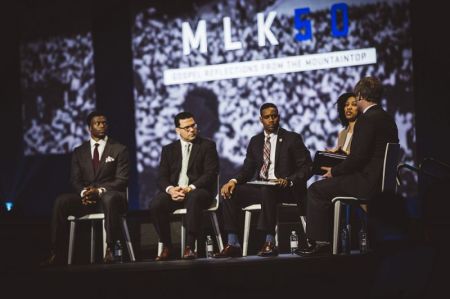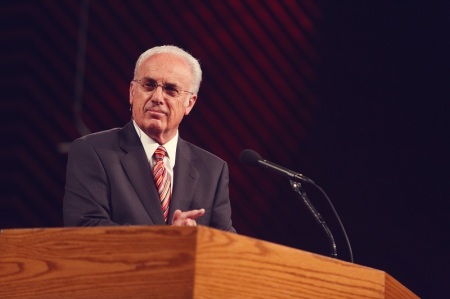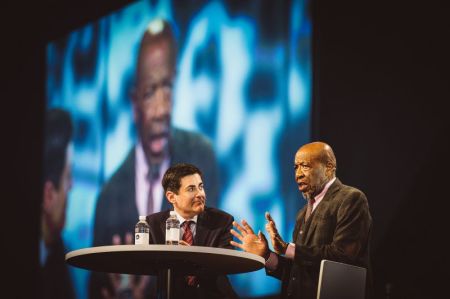More Than 3,000 Evangelicals, Churches Join John MacArthur in Statement Against 'Nebulous' Social Justice

More than 3,000 evangelical Christians and organizations have joined well-known theologian and pastor, John MacArthur, in endorsing a statement on social justice and the purported dangers the concept poses to the Gospel.
The statement comes in the wake of MacArthur's recent controversial series that brands social justice as a real threat to the Gospel.
"Clarity on these issues will fortify believers and churches to withstand an onslaught of dangerous and false teachings that threaten the gospel, misrepresent Scripture, and lead people away from the grace of God in Jesus Christ," the statement explains in an introduction.
"Specifically, we are deeply concerned that values borrowed from secular culture are currently undermining Scripture in the areas of race and ethnicity, manhood and womanhood, and human sexuality. The Bible's teaching on each of these subjects is being challenged under the broad and somewhat nebulous rubric of concern for 'social justice,'" it continued. "If the doctrines of God's Word are not uncompromisingly reasserted and defended at these points, there is every reason to anticipate that these dangerous ideas and corrupted moral values will spread their influence into other realms of biblical doctrines and principles."
And with that introduction, the statement then goes on to address 14 points of contention in the Gospel the signers agree need to be clarified, including what constitutes justice.

"WE DENY that true justice can be culturally defined or that standards of justice that are merely socially constructed can be imposed with the same authority as those that are derived from Scripture. We further deny that Christians can live justly in the world under any principles other than the biblical standard of righteousness," the statement says. "Relativism, socially-constructed standards of truth or morality, and notions of virtue and vice that are constantly in flux cannot result in authentic justice."
And even though it isn't specifically mentioned, the statement also challenges the notion of concepts such as "white guilt." It argues that except for the ties to original sin through Adam, people should not be blamed for the sins on their ancestors.
Addressing issues of human sexuality, the statement also firmly supports biblical marriage while dismissing the concept of "gay Christian."
"WE DENY that human sexuality is a socially constructed concept. We also deny that one's sex can be fluid. We reject 'gay Christian' as a legitimate biblical category. We further deny that any kind of partnership or union can properly be called marriage other than one man and one woman in lifelong covenant together," the statement argues.

"We further deny that people should be identified as 'sexual minorities'—which serves as a cultural classification rather than one that honors the image-bearing character of human sexuality as created by God," it adds.
The statement also came out strong against racial segregation and systemic racism as unbiblical.
"We deny that systemic racism is in any way compatible with the core principles of historic evangelical convictions. We deny that the Bible can be legitimately used to foster or justify partiality, prejudice, or contempt toward other ethnicities. We deny that the contemporary evangelical movement has any deliberate agenda to elevate one ethnic group and subjugate another. And we emphatically deny that lectures on social issues (or activism aimed at reshaping the wider culture) are as vital to the life and health of the church as the preaching of the gospel and the exposition of Scripture," the statement notes. "Historically, such things tend to become distractions that inevitably lead to departures from the gospel."
Ryan Burton King, pastor of Grace Baptist Church in the United Kingdom, who said he was invited to support the statement, explained in a blog post Tuesday that he could not support it in "good conscience."
"The statement remains in my view a cynical, misguided document that has been pitched by the wrong people, at the wrong time, in the wrong way, and with wrong ideas and understandings in the background," King argued.
"Purporting to address an alleged shift in evangelical circles away from the biblical gospel towards a false social gospel, the new Statement on Social Justice and the Gospel is driven by people I would like to believe are well-meaning but frankly not at all 'getting' what those whom it primarily addresses are saying. That is at best. At worst, it represents a toxic agenda to discredit and undermine godly men and women crying out for biblical social justice, national and ecclesiastical repentance, and meaningful reconciliation. I certainly hope that this statement will not become a litmus test for orthodoxy, as if those who don't sign it should be written off as 'not sound'," he said.
King then named a long list of high profile evangelicals such as Russell Moore, president of the SBC's Ethics & Religious Liberty Commission, and Washington, D.C. Pastor Thabiti Anyabwile of Anacostia River Church who have spoken out against racial sin in America.
Pastor of Cornerstone Baptist Church in Arlington, Texas, Dwight McKissic, as well as Anyabwile, praised King's comprehensive takedown of the statement.
"Ryan King nailed all of the reasons why this statement was/is unnecessary. One's signature on this document would be a red flag to many, concerning where signatories really stand regarding valid biblical social justice/issues & needed advocacy today," McKissic noted on Twitter.





















